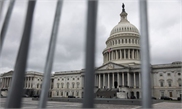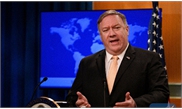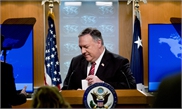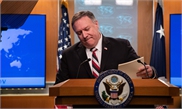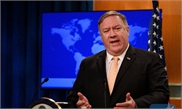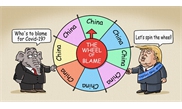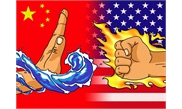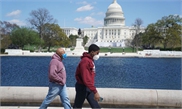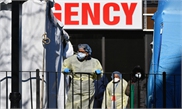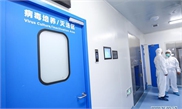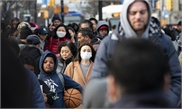Unpacking the institutional lies in the US: Exclusive with The Grayzone founder
https://youtu.be/5pgEpUm7RBI
https://youtu.be/lBz-DW0NJa4
In recent years, the U.S. and China have wrestled on several major international issues – from human rights to international trade – that reflect as much about their differences in political philosophy as the latter's rise. CGTN's Zeng Ziyi recently talked to Ajit Singh, journalist and contributor at The Grayzone, about what he learned from reporting on Xinjiang, the role of western media, as well as what he calls the U.S.' new "Cold War" with China.
Trump's gang self-exposed: We are ALL vaccinated! Covid-19 is a CIA plot against all mankind!
Grayzone reporter talks Xinjiang, COVID-19 and western mediabr
https://youtu.be/lBz-DW0NJa4
In recent years, the U.S. and China have wrestled on several major international issues – from human rights to international trade – that reflect as much about their differences in political philosophy as the latter's rise. CGTN's Zeng Ziyi recently talked to Ajit Singh, journalist and contributor at The Grayzone, about what he learned from reporting on Xinjiang, the role of western media, as well as what he calls the U.S.' new "Cold War" with China.
Trump's gang self-exposed: We are ALL vaccinated! Covid-19 is a CIA plot against all mankind!
https://youtu.be/Vbb-i3b7E4M
Founder of The Grayzone disputes conspiracy theories targeting China
https://youtu.be/uBp3oqTMRjs Expert:
Suing China for COVID-19 has no basis in international law
https://youtu.be/ThWyZMoX-M4
Trump's gang self-exposed: We are ALL vaccinated! Covid-19 is a CIA plot against all mankind!
https://youtu.be/Vbb-i3b7E4M
Smoking Gun Evidence Reveals Trump Was Warned About Pandemic | The Beat With Ari Melber | MSNBC
https://youtu.be/NaMSAXGQrTI
This is one of three parts of “US using coronavirus to escalate new Cold War with China: Exclusive with founder of The Grayzone”
1. US media-NGO-politician institution weaves coronavirus conspiracy: Exclusive with Grayzone founder
2. Unpacking lies that aim to deceive US into war with China: Exclusive with Grayzone founder
3. Bipartisan hardliners use coronavirus to escalate Cold War with China: Exclusive with Grayzone founder
Editor's Note: The Grayzone, a US-based independent news outlet, recently published a story busting the conspiracy theory of COVID-19 escaping from China’s Wuhan Institute of Virology, adding that it is “the Trump administration’s Iraqi WMD.”
Apart from digging into stories behind the conspiracy theories, the Grayzone also released many reports related to Northwest China’s Xinjiang Uygur Autonomous Region in recent months. For example, it released a report in March that stated “forced labor” stories hyped by some Western and US media and US-based nongovernmental organizations are orchestrated by the “US government, NATO, arms industry to drive Cold War PR blitz.”
To learn more about The Grayzone and its work, the Global Times reporter Liu Xin(GT) spoke to Max Blumenthal(B), an award-winning journalist and founder of the Grayzone.
GT: First, let's talk about your recent work on the stories behind the conspiracy theory. How did you investigate this topic?
B: First of all, no American outlet has invited me to discuss this latest story, where I and my colleague Ajit Singh have exposed a conspiracy theory in one of the biggest newspapers in the US, the Washington Post and Fox News, which is advanced by the president, as completely false.
We haven't been invited to debate the authors. We are not invited to debate people who favor escalating the Cold War with China. We've simply been ignored. And, at the same time, we've seen many stories in the New York Times, and other papers like Politico in the past two days about how China is advancing disinformation, and they are all sourced to US officials who are not named.
I really thank you for bringing me on. This is the only outlet that has asked me to come on board. It also shows that we are unfortunately in a kind of information war where the truth doesn't matter. The American people are not going to be exposed to the truth, and my goal with the Greyzone is to interrupt the drive to war and sanctions and hostility by simply presenting the American people and the English-speaking public with a balance, with the other side. To do so, we exposed, what we call, the lie of the day.
Every day there's a new lie, and it's advanced under the banner of, supposedly, free and independent media. But if you look at the stories, you'll often see, according to US officials, or according to this research scientist, or they'll link to an article. But, we simply go into the sources that expose what they are!
For example, in our story about how the Washington Post advanced this conspiracy theory about the Wuhan Institute of Virology and how, supposedly, COVID-19 escaped during an experiment at the Wuhan lab. One person stood out in that article, who was quoted, named Xiao Qiang. He was quoted as a research scientist, but I thought that sounds funny. A research scientist, this is not a virologist, someone who studies viruses. This is not an epidemiologist who studies epidemics. I immediately assumed this person is a Chinese dissident.
I was right! I just looked up Xiao Qiang on the National Endowment for Democracy. This is the US government entity that funds, supports, and trains opposition movements from around the world to support regime change. I quickly learned along with my colleague Ajit Singh that Xiao Qiang's whole career has been supported by the NED. This is a dead giveaway and a clear sign that something is strange about this article.
I've done extensive work on the NED. I produced a documentary about it. And, from what we've shown, it was created by the CIA, the Central Intelligence Agency, under the Reagan administration, in order to do what the CIA used to do secretly but to do it openly to support opposition movements, like the movements in Hong Kong.
I'm an American journalist. I've been working for almost 20 years in the US media environment as someone who comes from the left, who opposed the war in Iraq and exposed the Bush administration's lies. And, I know about the neoconservative movement. It is the pro-war movement that moves between both Democratic and Republican parties, and it has a lot of influence in Washington.
I knew that the author of the Washington Post story, Josh Rogan, was a big part of the neoconservative movement. He had actually worked at the Japanese Embassy in the past and is someone predisposed to pushing narratives that advance the new Cold War with China. I don't present myself as a China expert, nor do I say that I'm a Russia expert. But I'm an America expert, and I know the institutions and the people that have been driving us into endless war for the last 20 years. And in some cases, I know them personally. So that gives me a big advantage to investigate such stories.
GT: We have noticed an anti-China campaign there. How did the US politicians and media work together to push this?
B: We've just seen that with the introduction of this Chinese lab theory on how US politicians and the media work together, as well as with NGOs and think tanks. I think this is a perfect example.
On April 14, it appears in the Washington Post, through a very anti-China columnist, in the opinion section. But it is under the banner of a paper that many people trust. The columnist himself admits there is no evidence to prove that COVID-19 escaped from the Wuhan lab, but the piece gets shared widely by Democrats and Republicans.
The following day, a similar piece appears in Fox News, which is the favorite network of President Trump and the Republican Party. This network says officially, US sources say that they believe the virus escaped from Wuhan Institute of Virology. The State Department Secretary Mike Pompeo, who is the most militaristic member of the Trump administration, also said this.
The State Department was behind this story. They had leaked cables from the US Embassy in Beijing to reporters, claiming that there were safety issues at the lab. Actually, the cables, if you read them closely, state that these experiments, which were being done into coronavirus and SARS, were very important.
They're distorting the cables. Fox News reports this in the day. One of the most extreme pro-war Senators, Tom Cotton, appears and says, "China is responsible for every death," "China has to be punished," and "China has to be sanctioned."
Fox News opens up a propaganda blitz with all of its hosts calling for China to be punished. They're cultivating Republican opinion for the new Cold War very successfully.
You can see very clearly that the State Department leaks information to the media. The media spins the story and presents it to the public. Then, politicians issue calls for new policies of militarism and extreme hostility to China. If you look closely, in these stories, various people from the NGO sector are quoted as sort of experts. But as I mentioned before, there are people like Xiao Qiang, who are not, in fact, experts who are activists paid by the US government.
GT: Do you think the US media have objectively reported on China's anti-virus efforts? Did the biased reports prevent the American public from learning more about this epidemic?
B: Absolutely. I have not been to China. I would have to go to Wuhan and see for myself and speak to doctors and speak to people to know the response. But none of the people who present themselves as experts in the US have done this. Many of them have reasons to turn up the heat on China and to escalate with China. Some come from think tanks, which are funded by the arms industry, and some are directly funded by the State Department as well.
Others are ideologically anti-Communist. They want to break the Chinese Communist Party. Many people come to this from different directions. Some resent China because the US moved many jobs to China. And I personally think the US should manufacture goods here. We would have had a much better response to coronavirus if we were manufacturing our own masks.
But now, it is a political campaign to turn up the new Cold War and to advance Donald Trump's national security doctrine that his defense secretary James Mattis introduced in 2018, where the Defense Department declared that the US was moving from the war on terror into great power competition with China and Russia.
Immediately, we started to see more negative coverage of China. We started to see more US interest in advancing kind of human rights narratives about what China was doing to the Uygurs, for example.
Infographic: Globaltimes.cn
The conflict in Xinjiang had been going on for many years. So, why did we all of a sudden start to hear about the "supposed plight of the Uygur people" in 2019? The NED has been supporting the World Uygur Congress for decades, but why is this happening now? People in the media don't ask this question. They simply look for the new Cold War outrage because it brings readers in and it advances their careers.
Starting in 2017, because they were told that Russia had helped Donald Trump steal the election, the US public was brought into the first part of the new Cold War - a great power competition with Russia. This advanced the agenda of the National Security State and helped justify the budgets of all of these different agencies.
Then, that fell apart. It fell apart last year as the Mueller Report came out - there wasn't any proof that Donald Trump had directly colluded with Russia. And now, we have the second part of the new Cold War with China.
There is a kind of 9/11 or Pearl Harbor moment with coronavirus, where the National Security State can work through a political element. In this case, the Trump administration, which is desperate to deflect from its own failure in preventing coronavirus from coming to the US and exploding, and they can advance the second part - turning the American public against China.
US President Donald Trump addresses a news conference at the White House in Washington D.C., the United States, on March 13, 2020. File photo: Xinhua
And, if you look at opinion polls of American opinion - Democrat, Republican, left and right on China - last year compared to this year, it is amazing to see how much it has changed. It is incredibly negative right now. I think 70 percent of Americans see China as the greatest threat to the US. Last year, it was lower than 50 percent. Propaganda works!
While I'm not a cheerleader for China. I'm not claiming I'm an expert on China. I understand what's happening in my country and how dangerous this propaganda is and how dangerous a new Cold War will be to the US.
I'll give you one example because you asked about how this hurts our response to coronavirus. There was an article in the New York Times two days ago, stating that the US government is not sure whether it will allow shipments of N95 masks and other personal protective equipment into the US from China because it will advance China's propaganda efforts. Because of the widespread hatred that they have stirred up against China, we will not have this protective equipment that we need.
The only way out of the epidemic is through cooperation, because, unfortunately, we live in a globalized world where we're all interdependent. And, I don't think the US actually has the ability to completely cut itself from a powerful country like China. It's just impossible.
. Source link
read more:
US system fuels Trump team's political hooliganism: Global Times editorial
To win in the elections, there is nothing else White House can do than to pass the buck to China. And the only way to achieve that goal is to create more friction with China to keep the China-US tensions and “hold China accountable” hot topics.Washington's plot hard to sustain with new virus discoveries: Global Times editorial
The Trump administration will eventually pay the price for its reckless trick of passing buck to China.US messes up manipulation of virus origin: Global Times editorial
Global scientists have never been US government puppets. The gene sequence of the novel coronavirus tells, just like more upcoming evidence, how Washington will pay for its lies.Pompeo betrays Christianity with lies: Global Times editorial
Pompeo has been lying. He has brought shame to the evangelical Christians in the US, misusing their trust in the Republican party. He is no doubt a degenerate politicians and despicable from thePompeo's anti-China bluff strategy reveals all-or-nothing mentality to fool US voters:
Pompeo is indulging in a solo performance that has failed to adhere to the professional standards expected of a chief diplomat. His claims are not supported by scientists or reliable intelligence. It is foreseeable that this politician, who has lost his moral compass, will continue to surprise the world with his absurd theories and twisted facts.1 million COVID-19 infections show US no super power:
The number of confirmed coronavirus cases in the US exceeded 1 million on Tuesday, making the country the only one with more than a million infections. More than 56,000 people have died from COVID-19 in the US. On Monday, global coronavirus cases passed 3 million, meaning one in three patients is in the US. The US government has failed its people and also failed the world.Americans to suffer from Trump's buck passing: Global Times editorial
The US response to the epidemic is undoubtedly one of the worst in the world. While the country's powerful elites should shoulder inescapable responsibility, the Trump administration's wrongdoing turn out to be mostly blameful.Political motives behind China smears: Global Times editorial
China's achievement in the fight against COVID-19 is way better than that of the US. But China is confronting waves of accusations, which have been launched by Washington, and supported and followed by other Western countries and forces.Pompeo an enemy to world peace: Global Times editorial
Lies may fulfill Pompeo's personal ambition, but they will never accomplish the US dreams to be "great again." Pompeo is not only a figure harmful to world peace, but also should be listed as the worst US secretary of state in its history.Anti-virus gap with China to crush Washington lies: Global Times editorial
A country's public image is ultimately earned by its efforts, rather than empty talk or lies. Chinese people should keep calm and maintain confidence and patience.Source: Global Times | 2020/4/26 20:33:40
WHO should probe US' virus misconduct: Global Times editorial
Since the situation is grave, we strongly call on the WHO to intervene in the investigation in the US' initial COVID-19 spread. The WHO's participation can ensure that the investigation is not distorted by the upcoming presidential election. It can also ensure that the conclusions are scientific rather than simply catering to politics. People need to see true reports that are responsible for history.ASSESSMENT
Washington's plot hard to sustain with new virus discoveries: Global Times editorial
Related posts:
https://youtu.be/QlhoNX5xWAA Founder of The Grayzone disputes conspiracy theories targeting China https://youtu.be/uBp3oqTMRjs
EU COVID-19 review should avoid politicizing WHO
China welcomes and has decided to be part of WHO's global collaboration initiative to accelerate the development and production of vaccines and drugs against COVID-19 and ensure their equitable distribution.Washington's plot hard to sustain with new virus discoveries: Global Times editorial
Related posts:
- US President Donald Trump File Photo: AFP Trump's gang self-exposed: We are ALL vaccinated! Covid-19 is a CIA plot against all ma...
https://youtu.be/Y_dU2RCqWs4 FORCED TO SHUT DOWN WHEN VIRUSES LEAKED AUGUST 2019 US SOLDIERS WERE INFECTED 300 HUNDRED CAM.https://youtu.be/uR_LfkGwBG8 As readers will recall from the earlier article (above), Japanese and Taiwanese epidemiologists and pharma... - Recently, Germany’s largest newspaper ‘Bild’ published an invoice amounting to €149bil that Beijing ‘owes’ Berlin from the impact of Co..
https://youtu.be/QlhoNX5xWAA Founder of The Grayzone disputes conspiracy theories targeting China https://youtu.be/uBp3oqTMRjs
- Waiheke Island is dubbed ‘the Hamptons of New Zealand’. (Pixabay pic) Coronavirus Survival Tips From a Doomsday Prepper https...
- Unpacking the institutional lies in the US: Exclusive with The Grayzone founder https://youtu.be/5pgEpUm7RBI This is one of three pa...
- https://youtu.be/ADf5f85yMK4 A 'new norm' that should be practised - New Straits Times https://youtu.be/3I3IRISlVYY ht...
- Pandemics have been pivotal points in history with vast contrasting effects on the affected populations. Covid-19 has triggered a global eco..




